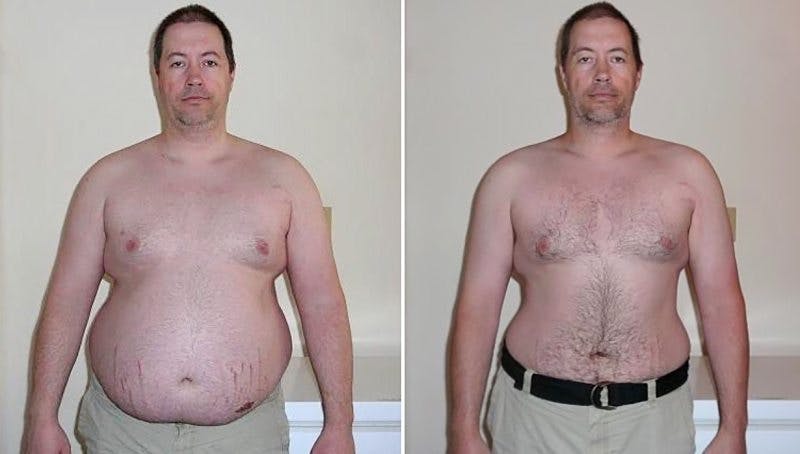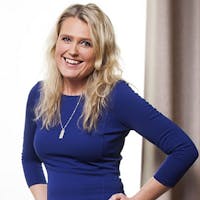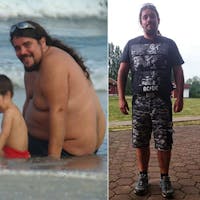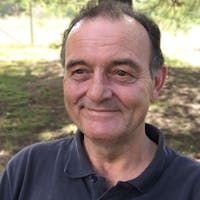How to quickly lose 50 pounds

Before and after 3 months
Here’s how Jason lost 50 pounds in just 3 months.
The email
Hi Andreas,
I’ve been a long time reader of your site and wanted to share my results of going low-carb in case it might help to inspire any readers who are on the fence about trying it since I achieved results so quickly.
The first picture was taken on April 26, 2015. In that picture I weighed 265 lbs (120 kg) and had a number of health issues. My main issue being that I had an extreme case of reactive hypoglycemia. I can honestly say that condition was pure hell. I had it so bad that I could literally smell something sweet, like a cake baking or perfume and I would be hypo within 10 seconds. I won’t get into the details of my symptoms, but the mental symptoms I can only describe as a nightmare.I’d managed to gain so much weight because with my insulin resistance issue (of course I was a pre-diabetic with those hypo issues… I also had the starting of gangrene at the end of my toes and floaters in my vision from ruptured blood vessels… which are all completely healed now). I had to eat so much to get my blood sugar back up.
Also, I had GERD and had to take over 10 extra strength Tums a day. The problem with that was I’d eat a bunch of food to stabilize my insulin and blood sugar, but because I ate so much I’d have to take more Tums, and the sweetness from the Tums would make me hypo again, then I’d have to eat again. It was a vicious circle.
My condition had gotten so bad that I knew I had to change. The final scare was heart palpitations and shortness of breath so bad that I thought I was going to have a heart attack, and that was enough of a scare to set me straight because I knew very bad things were going to happen NOW, not 10 years down the road (I was addicted to carbohydrates).
Long story short, the second picture was taken exactly 3 months after the first one, on July 26, 2015. In that picture I weigh 215 pounds (97 kg), for a weight-loss of 50 lbs (23 kg) in just 3 months, which is insane!
My reactive-hypo episodes are also pretty much completely gone as well, maybe a small bit of an adrenaline shot after my first few bites of food the odd meal but that’s it, and I expect to be completely healed in the following months. The only thing I have to watch out for is that I don’t eat way more fat than I do protein, since fat lowers blood sugar. So I eat about 70 grams of protein a day and about 80-90 grams of fat (I only eat once a day), and carbs are kept as low as possible, no starches, no sugar, no fruit, and no artificial sweeteners either.
I also didn’t exercise that much since it did take me a little longer to fat adapt than most because I had such extreme insulin resistance. I went to the gym a few times and walked here and there but nothing crazy, my weight loss was pretty much all from LCHF.
I don’t consider that second picture to be an after picture, my goal weight is 175 pounds (79 kg) so I’m going to send you another update in 3 months to share with the readers and I expect to be down at least another 30 pounds and have my health just keep improving and improving.
Thanks for all the great work you do, Andreas! And if anyone wants to contact me to find out exactly what I eat, etc… they can email me at jaymanwell@gmail.com.
Take care!
Jason
Comment
What a fantastic success story Jason, and looking forward to the follow up!
Update
Many people actually thought the pictures above were Photoshopped, as the change is so fantastic. But they were wrong. Here’s Jason’s update a few months later:
Progress: -30 pounds in another 3 months, total -80 pounds on LCHF!
Earlier success stories
Share your story
Do you have a success story you want to share? Send your information, plus before and after photos, to success@dietdoctor.com. It would also be greatly appreciated if you shared what you eat in a typical day, whether you fast etc. More information:
Share your story!


